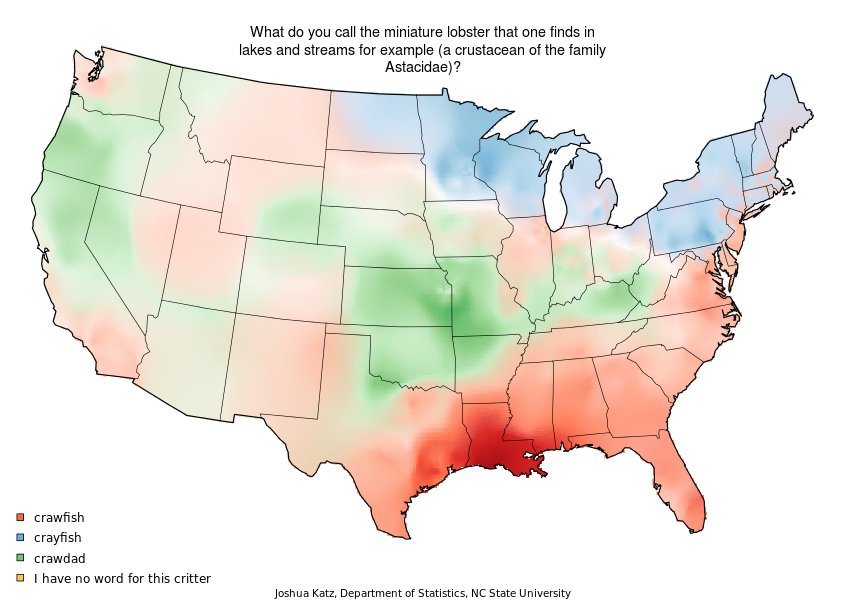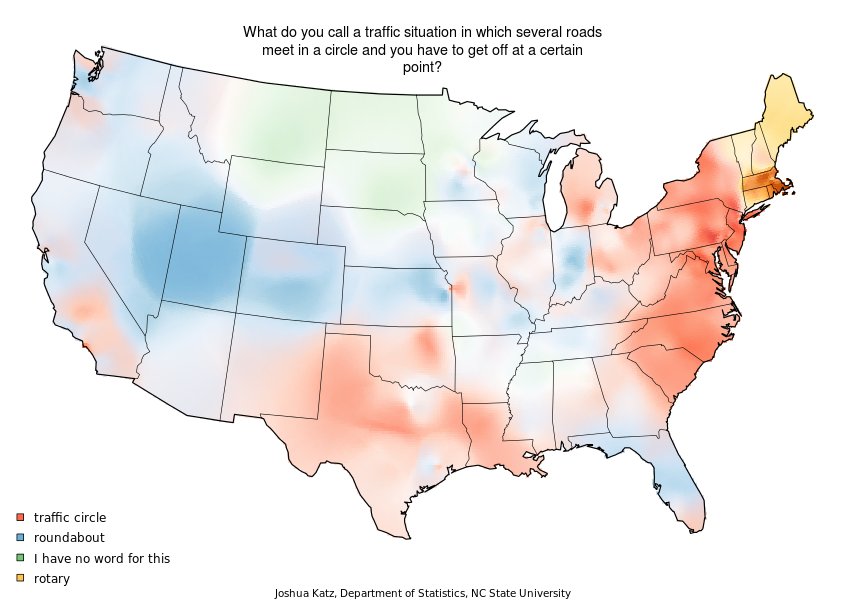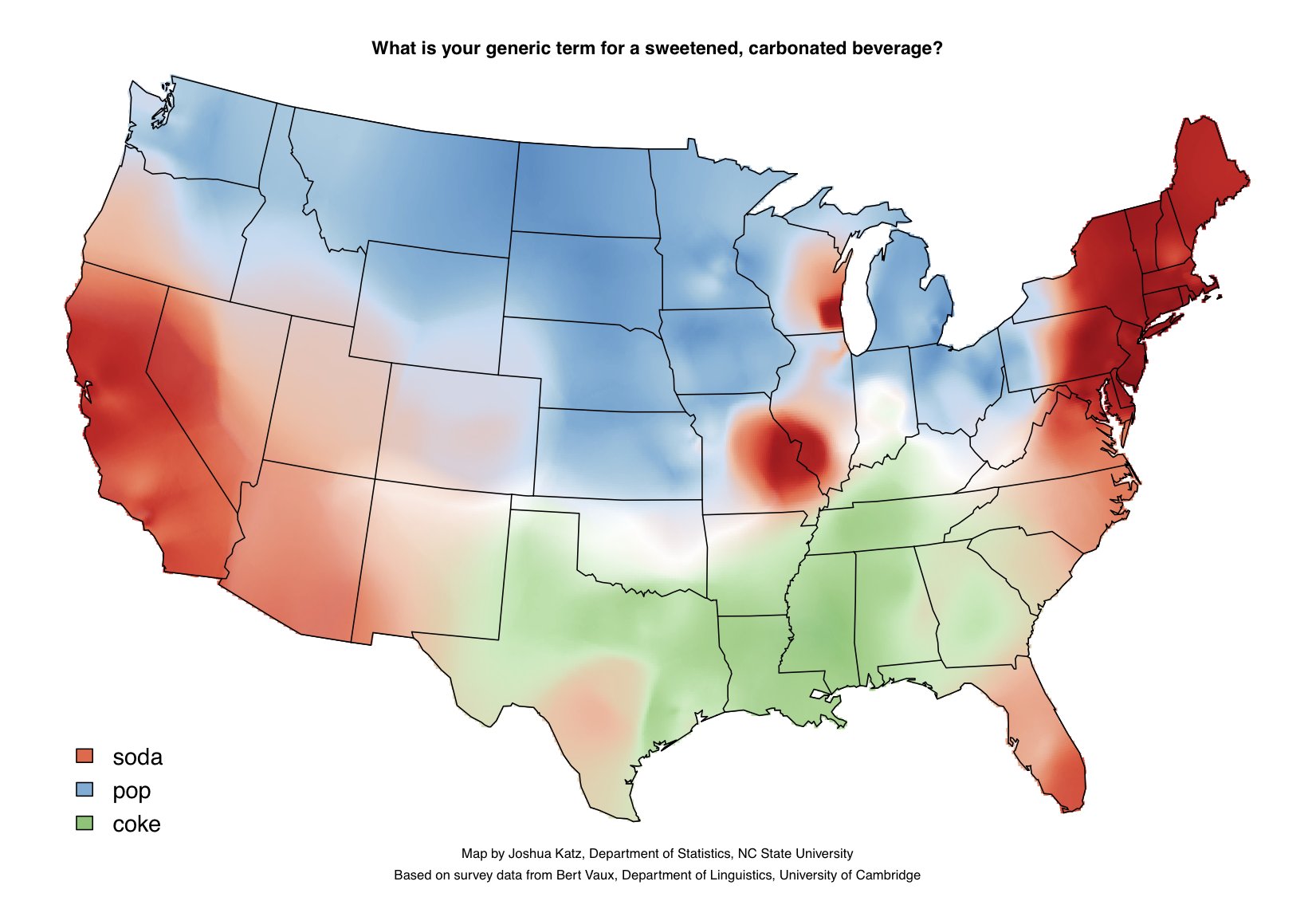カテゴリー:未分類
American Colloquialism Calamity – 英会話・英語 アミック
A few years ago, a survey went around American Facebook circles asking simply what part of the country you live in, what you call certain objects, and how you pronounce certain words. After finishing, you saw a map of how people answered the same questions in different parts of the country.
For some questions, the answers were nearly the identical across the board except for one small hotspot (e.g. only in a small part of Pennsylvania and New Jersey do they call a long sandwich with meat and lettuce a ‘hoagie’, whereas everywhere else it’s called a ‘sub’). For other questions, the answers varied wildly; here are a few of my favorites:



These illustrations are from designer Joshua Katz’s book, “Speaking American” and based on a pre-Facebook study done by Cambridge’s Bert Vaux et al. To take a similar version of the survey, check out The Cambridge Online Survey of World Englishes (also being conducted by Vaux).
Do you like dancing? 英会話・英語 アミック
I’m not a great dancer, but give me a dark club with a good sound system and this track in the mix and I might just blow your mind. Rizzla always brings the heat! :))
Love vs. Lava: The Story of Harry R. Truman 英会話・英語 アミック
Mount St. Helens, a volcano in Washington, erupted 38 years ago on May 18, 1980. The eruption was so strong that it deposited ash in 11 U.S. states and 5 Canadian provinces. Sadly, 57 people lost their lives in the resulting landslides and lava flows.
Among the 57 people who perished was a man named Harry R. Truman. During the 1930s, Harry opened a hotel at the foot of Mount St. Helens and ran it with his wife for over fifty years. Despite being made well-aware of the pending eruption, Harry was unwilling to evacuate to safety in the months preceding the volcanic explosion. He thought that geologists were being overly cautious and no actual harm would come to him if he stayed in his home at the base of the volcano. He loved Mount St. Helens and his home so much that he chose to stay despite the earthquakes that violently shook his home in the months preceding the eruption.
Harry truly believed that the lava would avoid him and he could continue to live in the area with ease. Unfortunately, despite one more attempt to get Harry to leave his home, the volcano erupted, covering his home with layers of debris and ash. Harry became a local folk hero for his unwillingness to leave while the rest of the area was being evacuated. He is remembered today as a stubborn man with an undying love of the wilderness of Mount St. Helens.
英会話・英語 アミック Must vs Have to
Must and have to
Both must and have to talk about obligations. Both are followed by an infinitive verb with no to.
Have to
Have to is used for obligations that others decide for us. These are often laws or rules and so cannot be changed.
- We have to show our passes to enter the building.
- You have to smoke outside. Smoking is not allowed inside.
- She has to have a license before she drives.
Must
We use must to talk about obligations we decide for ourselves or others.
- You must be more organised.
- I must exercise more often.
- We must clean the house today.
Memorial Day in America – 英会話・英語 アミック
This past Monday was Memorial Day in America. The national holiday always occurs on the last Monday of May and is in place to honor those U.S. military members that died while serving the country. Communities big and small mark the day by holding parades, special assemblies, and placing flags throughout local cemeteries.
In addition to being a day of remembrance, the day has other cultural significance as well. Much of the country has the day off work, so a popular pastime is to get together with friends and family for outdoor picnics and BBQ. The long weekend is seen as the unofficial start to summer, so many also take the opportunity to travel to nearby beaches or lakes to enjoy water activities for the first time in months. Many community swimming pools also begin their seasons at this time.
And for students, the day is a signpost that their school year is almost finished (if it hasn’t already!)














